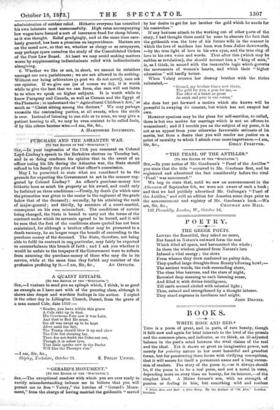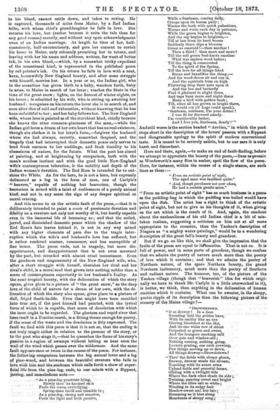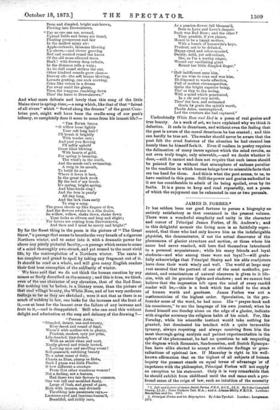BOOKS.
WHITE ROSE AND RED.*
THIS is a poem of great, and in parts, of rare beauty, though it falls now and again for brief intervals to the level of the prosaic and the common-place, and indicates, as we think, an ill-adjusted balance in the poet's mind between the rival claims of the real and the ideal. Yet it shows so great an imaginative power, not merely for painting nature in her most beautiful and grandest forms, but for penetrating these forms with vivifying conceptions, that it will secure for itself a permanent name and a long succes- sion of readers. The story of the poem is,—as it always should be, if the poem is to be a real poem, and not a novel in verse, depending more on story than on beauty, for its interest,—of the simplest kind. A Maine farmer's son, with no strength of passion or feeling in him, but something wild and restless • While Rose clad Red: a Love Story. By the Author of "BC Abe." London fftrahan.
in his blood, cannot settle down, and takes to roving. He is captured, thousands of miles from Maine, by a Red Indian tribe, with whose chief's granddaughter he falls in love. She returns his love, but (rather because it suits the tale than for any good reason) secretly, and without any open acknowledgment even of an Indian marriage. At length he tires of her, half- consciously, half-unconsciously, and gets her consent to revisit his home in Maine, only solemnly promising her to return, and leaving with her his name and address, written, for want of better ink, iu his own blood,—which, by a somewhat tricky expedient of the sensational kind, is represented in the published poem by red printer's ink. On his return be falls in love with a neat, keen, housewifely New England beauty, and after some struggle with himself, marries her. In a year or so, the Indian girl, who in the meantime has given birth to a baby, wanders forth, baby in arms, to Maine in search of her lover ; reaches the State in the time of the great snow ; lights, on the fiercest of winter nights, on his house ; is admitted by his wife, who is sitting up awaiting her husband ; recognises on his return the lover she is in search of, and soon after dies of cold and exhaustion, without knowing that he has been unfaithful to her ; and her baby follows her. The New England • wife, whose love is painted as of the starchiest kind, chiefly because she knows the utter common-placeness of the man,—while the Indian girl loves a dream of her own heart that has no real existence, though she clothes it in her lover's form,—forgives the husband whom she had always, secretly, somewhat despised, and the tragedy that had interrupted their domestic peace only serves to lend fresh sarcasm to her scoldings, and fresh timidity to his clumsiness of nature, for the future. What the poet has aimed at painting, and at heightening by comparison, both with the -man's soulless instinct and with the good little New-England wife's contemptuous toleration, is the nobility and depth of the Indian woman's devotion. The Red Rose is intended far to out- shine the White. Aa for the hero, he is not a hero, but expressly delineated as a log in the form of man, one of Carlyle's "beavers," capable of nothing but beaveriam, though the beaverism is mixed with a taint of restlessness of a purely animal kind, and not in any sense the sign of any deeper spiritual or moral craving.
And this seems to us the artistic fault of the poem,—that it is deliberately intended to paint a waste of passionate devotion and fidelity on a creature not only not worthy of it, but hardly capable even in the immortal life of becoming so ; and that the soiled, jarred, and diminished domestic peace which the shadow of the Red Rose's fate leaves behind it, is not in any way mixed with any higher elements of pain due to the tragic inter- ruption which, the wife's and husband's love has suffered, -but is rather rendered coarser, commoner, and less susceptible of .fine issues. The poem ends, not in tragedy, but mere dis- appointment, and disappointment that is not even mourned by the Net, but recorded with -almost cruel insouciance. Even the goodness and magnanimity of the New-England wife, who,
• after a short struggle with herself, cherishes her rival and her rival's child, is a moral seed that grows into nothing nobler than a sense of contemptuous superiority to her husband's frailty. As the semi-tropical beauty, with the delineation of which the story opens, gives place to a picture of "the great snow," so the deep love of the child of nature for a dream of her own, with the de- lineation of which the story also opens, gives place to a pieture of dull, frigid death-in-life. Even that might have been moulded
into true art, if the poet himself had painted, with the lyrical force of wlaich he is capable, that sense of desolation with which the issue aught to be regarded. The glorious and rapid river that loses itself in a Pontine marsh, is a. fitting theme enough for poetry,
if the sense of.the waste and the desolation is fitly expressed. The fault we find with this poem is .that it is not so, that the ending is
not truly tragic either in relation to the persons of the story, or tp the poet who sings it,—that he quenches the flame of his story's page= in a region of swamps without letting us hear even the wail of the wind which passes over the wilderness. And the same fault appears once or twice in the course of the poem. For instance, the following comparison between- the big animal lover and a log of pine-wood, and between the beautiful creature who falls in love with hiru and the sunbeam which calls forth a show of super- ficial life from the pine-log, ends, to our minds with a flippant, jarring, and unmelodious note :— '- As a pine-leg prostrate lying,
Slowly thro' its knotted akin Feels the warm revivifying Spring-time thrill and tremble in ; A, .a pine-log, strong and massive, Feels the light and lieth passive, While a Sunbeam, coming daily,
Creeps upon its boom gaily;
Warms the bark with quick pulsations,
Warms and waits each day in patience, While the green begins to brighten,
And the sap begins to heighten,—
Till at last from its hard bosom
Suddenly there slips a blossom
Green as emerald !—then another Then a third then more and more Till the soft green bud-knots smother What was sapless wood before; Till the thing is consecrated
To the spirit of the Spring,
Till the love for all things fated Burns and beautifies the thing ;— And the wood-doves sit and con it, And the squirrels from on high Fluttering drop their nuts upon it And the bee and butterfly Find it pleasant to alight there, And taps busy morn and night there Many a bird with golden beak ; Till, since all has grown so bright there, It would cry (if Logs could speak), 'Sunbeam, sunbeam, I'm your debtor !
I was fit for firewood nearly.
I'm considerably better,
And I love you, Sunbeam, dearly !'"
Andatill worse is the section headed " Arretez," in which the poet stops short in the description of the lovers' passion with a flippant and disagreeable apology to the spirit of modern conventional taste. It is meant to be severely satiric, but to our ears it is only harsh and discordant.
Here and there, again,—to make an end of fault-finding, before we attempt to appreciate the beauty of the poem,—lines as prosaic as Wordsworth's many flies in amber, spoil the flow of the poem. Here, for instance, within the course of a single stanza, are such lines as these :—
4, From an artistic point of sight,
The aged man was faultless quite."
"And, though perchance not over clean, He had a certain gentle mien."
"From an artistic point of sight" has as much business in a poen) as the pudding-bag in which the pudding was boiled would have upon the dish. The artist has a right to think of the artistic point of sight, but not to give us his thoughts of it, when giving us the art which is the result of it. And, again, the candour' about the uncleanliness of his old Indian chief is a bit of mis- taken realism, suggesting a criticism on him not at all more appropriate to the occasion, than the Yankee's description of Niagara as "a mighty water-privilege," would be to a wondering description of the great fall's beauty and grandeur.
But if we go on like this, we shall give the impression that the faults of the poem are equal to ititheauties. That is not so. It is full of power, and in some parts of grandeur, though we confess that we admire the poetry of nature much more than the poetry of love which it contains ; and that we admire the poetry of Northern nature, of the spare Northern beauty, the grand Northern inclemency, much more than the poetry of Southern and radiant nature. The humour, too, of the picture of the Yankee village (though that " beaverish" idea for which origi- nally we have to thank Mr. Carlyle is a little overworked in it), is better, we think, than anything in the delineation of human, emotion which it contains. What can be sweeter, in the sleepy, poetic ripple of its description than the following picture of the scenery of the Maine village
DROWSIETOWN.
"0 so drowsy In a daze
Sweating 'mid the golden haze, With its smithy like an eye Glaring bloodshot at the sky, And its one white row of street Carpetted so green and sweet, And the loungers smoking still Over gate and window-sill ; Nothing coming, nothing going, Locusts grating, one cock crowing, Few things moving up or down, All things drowsy—Drowsietown!
41 Thro' the fields with sleepy gleam, Drowsy, drowsy steals the stream, Touching with its azure arms Upland fields and peaceful farms, Gliding with a twilight tide
Where the dark elms shade its side ; Twining, pausing sweet and bright Where the Mies sail so white; Winding in its sedgy hair Meadow-sweet and iris fair ; Humming as it hies along Monotones of sleepy song ; Deep and dimpled, bright nut-brown, Flowing into Drowsietown.
"Far as eye can see, around, Upland fields and farms are found, Floating prosperous and fair In the mellow misty air: Apple-orchards, blossoms blowing Up above,—and clover grow ing Red and scented round the knees Of the old moss-silvered trees. Hark ! with drowsy deep refrain, In the distance rolls a wain ; As its dull sound strikes the ear, Other kindred sounds grow clear— Drowsy all--the soft breeze blowing, Locusts grating, one cock crowing, Cries like voices in a dream Far away amid the gleam, Then the waggons rumbling down Thro' the lanes to Drowsietown."
And -what more delicate and lovely than this song of the little Maine river in spring-time,—a song which, like that of that "fairest of all rivers" which " flowed along the dreams" of the great Cum- brian poet, might well have been the cradle-song of our poet's infancy, so completely does it seem to come from his inmost life?— ,. THE RrrEn SLCGS.
"0 willow loose lightly
Your soft long hair!
I'll brush it brightly With tender care; And past you flowing I'll softly uphold Great lilies blowing With hearts of gold.
For spring is beaming, The wind's in the south, And the musk-rat's swimming, A twig in its mouth, To build its nest Where it loves it best,
In the great dark nook
By the bed o' my brook.
It's spring, bright spring, And blue-birds sing !
And the fern is pearly All day long.
And the lark rises early To sing a song.
The grass shoots up like fingers of fire, And the flowers awake to a dim desire, So willow, willow, shake down, shake down Your locks so silvern and long and slight; For lovers are coming from Drowsietown, And thou and I must be merry and bright!"
By far the finest thing in the poem is the picture of "The Gre,at Snow," a passage that seems to breathe the very breath of a rigorous Northern winter, and to enter into it with a dramatic power far above any purely pictorial faculty,—a passage which seems to come of a mind thoroughly awe-struck, and yet roused to the most vivid life, by the contemplation of a Northern winter. The canto is too complete and grand to spoil by taking any fragment out of it. It should be read as a whole, and will give many English readers their first true conception of the sublimity of winter.
We have said that we do not think the human emotion by any means so finely described as the scenery ; and this is true, we think, even of the one character of any elevation, that of the Red Rose. Bat nothing can be better, in a literary sense, than the picture of that cool village beauty, the White Rose, and of her very moderate feelings so far as they are sketched ; were it not that as there is so much of nobility in her, one looks for the increase and the fruit of it,—or at least for the lament over the failure of any increase and fruit to it,—and is disappointed. Still who can read this without delight and admiration at the easp and delicacy of the drawing ?— 4. Pinning A.101. A.
"Dimpled, dainty. one-and-twenty, Rosy-faced and round of limb, Warni'd with mother-wit in plenty, Prudent, modest, spry yet prim, Lily-handed, tiny-footed, With an ankle clean and neat, Neatly gloved and trimly booted, Looking nice and smelling sweet! Self-possess'd, subduing beauty To a sober sense of duty, Chaste as Dian, plump as Hebe, Such I guess was little Flacebe. 0 how different a creature
From that other wondrous woman! Not a feeling, not a feature, Had these two fair flowers in common. One was tall and moulded finely, Large of limb, and grand of gaze, Rich with incense, and divinely Throbbing into passionate rays,—• Lustrous-eyed and luscious-besot:IA, Beautiful, and richly rare,
As a passion-flower full blossom'd, Born to Love and Love's despair. Such was Red Rose; and the other ?
Tiny, prudish, if you please, Meant to be a happy mother, With a bunch of housewife's keys. Prudent. not to be deluded, Happy -eyed and sober-moodeci, Dainty, mild, yet self-reliant, She, as I'm a worthy singer, Wound our vacillating giant Round her little dimpled finger."
"Half indifferent unto him, Far too wise to coax and woo him, Ill-disposed to waste affection, Full of modest circumspection, Quite the bright superior being, Tho' so tiny to the seeing, With a mind which penetrated, In a sly and rosy mirth, Thro' the face, and estimated Grain by grain the spirit's worth, Plumb° Anna, unenraptured, Led the creature she had captured."
Undoubtedly Mite Rose and Red is a poem of real genius and true beauty. As a work of art, we have explained why we think it, defective. It ends in dreariness, and without even the feeling that the poet is aware of the moral dreariness he has created ; and this can hardly be true art. The reader should never be aware that the poet felt the cruel features of the situation he had created less keenly than he himself feels it. Even if realism in poetry requires. the delineation of many issues against which the mind revolts, as not even truly tragic, only miserable,—and we doubt whether it does,—still it cannot and does not require that such issues should be painted for us 'without that atmosphere of sadness peculiar to the condition in which human beings bow to miserable facts that are too hard for them. And this is what the poet seems, to us, to- have omitted in this poem. Still the power and genius embodied in it are too considerable to admit of itEi being spoiled, even by its faults. It is a poem to keep and read repeatedly, not a poem, of which the enjoyment can be exhausted in one or two perusals.




































 Previous page
Previous page